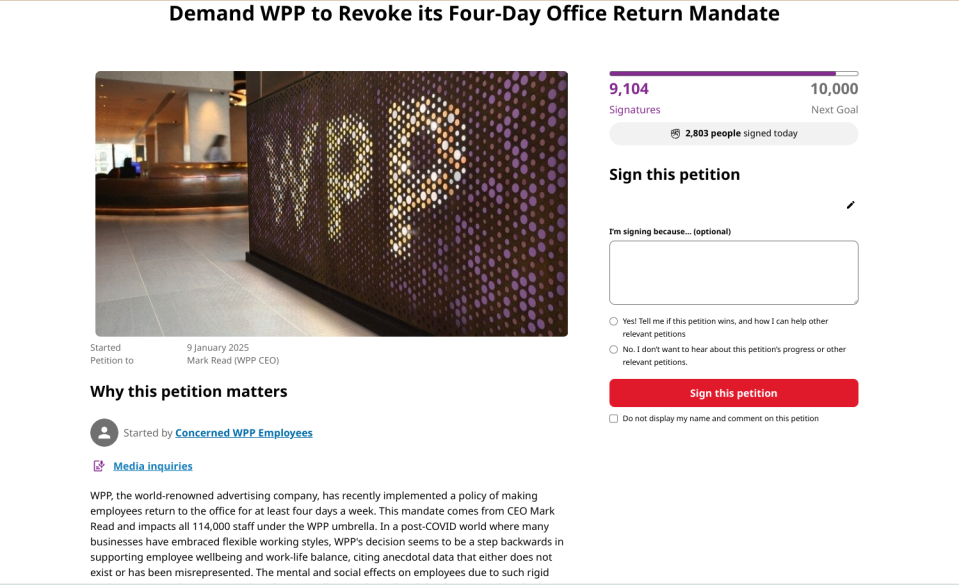Petition against WPP four-day office policy hits 10,000 signatures
A petition demanding that WPP revokes its new four-day office policy has attracted over 10,000 signatures in just four days, as backlash from staff grows against the ad giant’s decision to mandate a higher level of attendance at its offices worldwide. The Change.org petition, which claims to have been set up by a group of [...]


A petition demanding that WPP revokes its new four-day office policy has attracted over 10,000 signatures in just four days, as backlash from staff grows against the ad giant’s decision to mandate a higher level of attendance at its offices worldwide.
The Change.org petition, which claims to have been set up by a group of ‘concerned WPP employees’, calls on WPP chief executive Mark Read to reconsider the policy, branding it a “step backwards in supporting employee wellbeing and work-life balance”.
Last week, City AM revealed that the FTSE 100 ad holding group had demanded staff across the dozens of countries in which it operates to return to the office four days a week, including at least two Fridays every month.
In a company-wide memo, Read cited results from WPP’s employee engagement surveys and client expectations as being the core reasons behind the decision, writing: “The data from across WPP agencies shows that higher levels of office attendance are associated with stronger employee engagement, improved client survey scores and better financial performance.”
But the move has been met with fierce resistance by a vocal share of its more-than 100,000 staff across the globe, and the petition has attracted signatures at a rapid rate.
As of Monday evening, 10,037 people had signed since it went live on 9 January, with over 2,000 signatories having put their name to it on Monday alone, according to host site Change.org.
The page’s public nature means signatories aren’t necessarily restricted to WPP employees, but City AM has been able to verify several signatories, including some of those using the petition’s comments section as an arena to voice their displeasure.

“This decision reeks of corporate shortsightedness, where the comfort of shareholders is valued more than the needs of the very employees who drive the company’s success,” wrote one staffer who works at the WPP-owned media agency Mindshare. “It’s clear that the voices of us WPP employees are being ignored and sacrificed on the altar of outdated notions of workplace control and profit margins.”
A second employee, from the US arm of Wavemaker, said the move “runs in direct opposition to the values WPP claims to espouse”, citing the added carbon footprint of staff travelling to the office more often.
The decision from WPP top brass comes as it battles to free itself from a period of lethargic performance which has seen revenues flatline and its share price fall 40 per cent since the start of 2022.
The bruising period looks set to crystallise in the coming months. French rival Publicis will almost certainly overtake the London-listed giant as the world’s largest advertising group when it next reports at the end of the first quarter.
The ringleaders behind the petition argue that the ad firm’s new policy is likely hamper, as opposed to kickstart, WPP performance, and claims that the data Read used in his memo to staff “either does not exist or has been misrepresented”.
“The mental and social effects on employees due to such rigid work regimes can be extensive,” they said on the petition’s page.
A WPP spokeswoman said: “We believe this is the right policy for the long-term interests of the company as a whole, knowing that it won’t be popular with everyone.
“And we will take the time to implement it in a collaborative and pragmatic way with our teams.”
